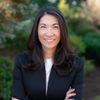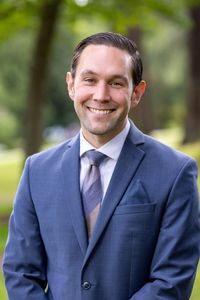Ryan McIrvin
Ryan McIrvin ran for election to the King County Council to represent District 5 in Washington. He lost in the primary on August 5, 2025.
McIrvin completed Ballotpedia's Candidate Connection survey in 2025. Click here to read the survey answers.
Biography
Ryan McIrvin was born in Redmond, Washington. He earned a high school diploma from Decatur High School and a bachelor's degree from Western Washington University in 2006. His career experience includes working in government relations for the University of Washington Bothell and the Snohomish County-Camano Association of REALTORS.[1]
As of 2025, McIrvin was affiliated with the following organizations:[1]
- Issaquah Alps Trails Club, Board Member
- Renton parkrun, Volunteer
- Girls on the Run Puget Sound, Coach
- Leukemia & Lymphoma Society Team in Training, Coach, Captain, and Mentor
- Renton Human Services Advisory Committee, Member
- Birthday Dreams, Volunteer
Elections
2025
See also: Municipal elections in King County, Washington (2025)
General election
General election for King County Council District 5
Steffanie Fain defeated Peter Kwon in the general election for King County Council District 5 on November 4, 2025.
Candidate | % | Votes | ||
| ✔ |  | Steffanie Fain (Nonpartisan)  | 55.0 | 23,457 |
| Peter Kwon (Nonpartisan) | 44.4 | 18,940 | ||
| Other/Write-in votes | 0.5 | 230 | ||
| Total votes: 42,627 | ||||
 = candidate completed the Ballotpedia Candidate Connection survey. = candidate completed the Ballotpedia Candidate Connection survey. | ||||
| If you are a candidate and would like to tell readers and voters more about why they should vote for you, complete the Ballotpedia Candidate Connection Survey. | ||||
Do you want a spreadsheet of this type of data? Contact our sales team. | ||||
Nonpartisan primary election
Nonpartisan primary for King County Council District 5
The following candidates ran in the primary for King County Council District 5 on August 5, 2025.
Candidate | % | Votes | ||
| ✔ | Peter Kwon (Nonpartisan) | 27.7 | 9,101 | |
| ✔ |  | Steffanie Fain (Nonpartisan)  | 24.1 | 7,904 |
 | Kim-Khanh Van (Nonpartisan) | 23.3 | 7,657 | |
 | Ryan McIrvin (Nonpartisan)  | 11.6 | 3,798 | |
| Angela Henderson (Nonpartisan) | 6.9 | 2,256 | ||
 | Ahmad Corner (Nonpartisan) | 6.0 | 1,959 | |
| Other/Write-in votes | 0.5 | 152 | ||
| Total votes: 32,827 | ||||
 = candidate completed the Ballotpedia Candidate Connection survey. = candidate completed the Ballotpedia Candidate Connection survey. | ||||
| If you are a candidate and would like to tell readers and voters more about why they should vote for you, complete the Ballotpedia Candidate Connection Survey. | ||||
Do you want a spreadsheet of this type of data? Contact our sales team. | ||||
Endorsements
To view McIrvin's endorsements as published by their campaign, click here. Ballotpedia did not identify endorsements for McIrvin in this election.
Campaign themes
2025
Ballotpedia survey responses
See also: Ballotpedia's Candidate Connection
Ryan McIrvin completed Ballotpedia's Candidate Connection survey in 2025. The survey questions appear in bold and are followed by McIrvin's responses.
| Collapse all
In my time on Renton City Council, I have worked to increase the supply of affordable housing by supporting zoning reforms and development projects near transit. I have advocated for expanded transit service to reduce congestion and improve access to jobs and services. I also prioritize investments in public safety programs that provide support to people experiencing homelessness and mental health challenges.
Beyond elected office, I have a background in policy and advocacy with experience in economic development and local government. I serve on the board of the Issaquah Alps Trails Club, where I help preserve and maintain trail access for outdoor recreation. Running ultramarathons has taught me the value of persistence, teamwork, and incremental progress, which I bring to my public service.
I am proud to call this region home and honored to serve the community where I am raising my family. I look forward to continuing to work collaboratively with residents, businesses, and partners to build a stronger, more affordable, and safer King County for everyone.- 1. Building Affordable, Sustainable Communities Affordable housing is one of the biggest challenges facing King County. I am committed to expanding housing options by supporting smart growth strategies that focus on building near transit hubs and existing infrastructure. This includes advocating for zoning reforms that allow diverse housing types like accessory dwelling units and middle housing. At the same time, I believe we must protect our open spaces and natural resources to maintain the region’s quality of life. By balancing development with conservation, we can create communities that are both affordable and sustainable for current and future generations.
- 2. Prioritizing Community Safety and Support Community safety goes beyond policing—it requires a holistic approach that includes mental health services, substance use treatment, and stable housing options for those experiencing homelessness. I support investments in public safety programs that provide coordinated responses tailored to individual needs. This means improving emergency services, increasing outreach and case management, and building partnerships that address root causes of crime. I am dedicated to fostering safe, inclusive neighborhoods where everyone has the support and security they need to thrive.
- 3. Driving Results Through Collaboration and Accountability Effective leadership means bringing people together to find practical solutions and delivering measurable results. I prioritize transparency, fiscal responsibility, and data-driven decision-making to ensure taxpayer dollars are used efficiently. Eliminating waste and redundancies in government programs is critical to maximizing impact. I listen closely to diverse voices across the community and work to build consensus around policies that move King County forward. My campaign is about steady progress, collaboration, and accountable governance that puts people first.
My dad was active in the Lions Club and served as an adult leader in my scout troop. Through his involvement, he demonstrated the importance of community service and giving back. He took me hiking and backpacking, instilling in me a love for the outdoors and an appreciation for nature’s challenges and rewards.
He also ran marathons and inspired me to take up running as a way to push my limits and develop discipline. His example showed me how perseverance and setting long-term goals can lead to meaningful achievement.
What I admire most about my dad is his resilience and ability to remain calm and thoughtful in challenging situations. Whether facing personal or professional obstacles, he demonstrated patience and problem-solving skills that often led to positive outcomes. His example motivates me to approach public service with a similar mindset focused on listening, collaborating, and finding practical solutions.
Rawls introduces the idea of the “original position” and the “veil of ignorance,” a thought experiment where individuals choose principles of justice without knowing their own place in society. This encourages rules that are fair and just for everyone, especially those with the least advantage. His concept of “justice as fairness” deeply influences my approach to policymaking.
My philosophy is grounded in the belief that government should create equitable opportunities for all residents and protect those who face systemic barriers. This means supporting policies that address affordable housing, access to quality education, and economic opportunity, while also balancing individual rights and community well-being.
Rawls’s emphasis on fairness and moral reasoning inspires my commitment to pragmatic, inclusive leadership that listens to diverse voices and strives for consensus. I believe that public policies must be evaluated not only by their outcomes but by how just and equitable their processes are.
Integrity means being honest, transparent, and consistent in word and deed. Voters must trust that their representatives will act ethically, put the public interest above personal or political gain, and communicate openly even when decisions are difficult.
Accountability is essential. Officials must be answerable to their constituents, willing to listen, accept feedback, and adapt policies when needed. They should use data and measurable outcomes to evaluate the effectiveness of programs and be willing to eliminate waste or duplication to maximize impact with public resources.
Collaboration is critical in today’s diverse communities. Effective leaders bring people together across differences, build consensus, and seek win-win solutions. This means listening to a wide range of perspectives and working respectfully with colleagues, stakeholders, and community members.
Pragmatism guides good decision-making. While values and vision are important, solutions must be practical, achievable, and informed by evidence. I believe in relentless incremental progress, like training for a marathon. Success requires steady effort and realistic steps, not just grand promises.
Finally, elected officials must have a commitment to community. They should have a genuine desire to improve people’s lives. This includes focusing on equity, ensuring that policies serve all residents fairly, especially historically underserved groups, and fostering a sense of shared purpose and belonging.
I am a pragmatic problem-solver who focuses on results. I believe in listening carefully to diverse perspectives and using data and evidence to inform decisions. This approach allows me to find common ground and craft policies that deliver real, measurable benefits. I am comfortable navigating complex challenges with patience and persistence, knowing that meaningful progress often comes incrementally.
Collaboration is a core strength of mine. I have experience bringing people together across differences to build consensus and shared solutions. I value respectful dialogue and believe that diverse voices make policy stronger. I work well with community members, stakeholders, and fellow officials to move initiatives forward.
In addition, I am deeply connected to this community and understand the unique needs and opportunities we face. As a lifelong resident and public servant, I am committed to serving all residents with fairness and empathy.
My background as a trail runner and outdoor enthusiast has also shaped my character. Running ultramarathons has taught me discipline, resilience, and the importance of steady effort toward long-term goals. These qualities translate directly into my approach to public service.
Lastly, I am dedicated to transparent and accountable governance. I believe government should be accessible and responsive, with clear communication and openness to input.
First and foremost, a councilmember must listen to the people they represent. This means engaging with communities across the district, urban, suburban, and rural, to understand their needs, concerns, and aspirations. Effective representation requires balancing diverse perspectives and advocating for policies that promote equity, inclusion, and opportunity for all residents.
A key responsibility is policy-making. Councilmembers set priorities on issues such as affordable housing, transportation, public safety, environmental protection, and economic development. They must analyze complex challenges, work collaboratively to develop solutions, and pass legislation that advances the well-being of the county.
Fiscal stewardship is another critical duty. Councilmembers approve the county budget, which funds a wide range of services including public health, parks, roads, transit, and social programs. They must ensure tax dollars are spent efficiently, reduce waste, and prioritize investments that provide measurable benefits. Transparency and accountability in budgeting build public trust.
Oversight and accountability extend to county departments and agencies. Councilmembers hold hearings, review performance data, and work with the executive branch to improve service delivery. They must be vigilant in ensuring government programs are effective and responsive.
Finally, councilmembers serve as community leaders and conveners. They bring together stakeholders, residents, businesses, nonprofits, and other governments to foster partnerships that address shared challenges. By building consensus and facilitating dialogue, they help create a more connected, resilient county.
I hope my efforts will have helped expand affordable housing options while protecting our environment and open spaces, ensuring that future generations can thrive in vibrant, sustainable communities. I want to leave a legacy of safer neighborhoods where public safety is paired with compassionate support for those facing behavioral health and homelessness challenges.
Additionally, I want to be known for bringing transparency and accountability to government, making it more responsive and trustworthy. I aspire to inspire others to engage in public service and believe that steady, pragmatic leadership rooted in collaboration and persistence can move communities forward.
The fall of the Berlin Wall symbolized the end of the Cold War and the beginning of a new era of hope, freedom, and the possibility of bridging deep divisions. It was a powerful reminder that even long-standing barriers, whether physical or ideological, can come down when people demand change and work toward unity.
Although I was young, this event left a lasting impression on me about the importance of courage, perseverance, and the pursuit of justice. It highlighted how collective action and resilience can overcome oppression and bring about meaningful transformation.
Over time, I took on greater leadership responsibilities, serving as an area director for basic scout skills. In this role, I oversaw instruction in essential outdoor skills and helped develop youth’s confidence and competence in nature. Additionally, I helped lead a high adventure program that included mountain biking, rock climbing, and backpacking, providing challenging and rewarding experiences for campers.
These experiences were foundational in shaping my leadership style and values. I learned how to foster teamwork, encourage personal growth, and lead by example. Working in these roles required patience, adaptability, problem-solving, and a deep commitment to service.
This struggle has taught me important lessons about time management, prioritization, and the value of support networks. It has strengthened my commitment to effective planning and making deliberate choices that honor both my professional duties and my role as a father.
Through this challenge, I have also gained a deeper understanding of the everyday pressures many families face in our community, from juggling work and caregiving to finding affordable housing and reliable transportation. These experiences have made me more empathetic and motivated to advocate for policies that support families and promote work-life balance.
King County Democrats
King County Young Democrats
AFT Washington (American Federation of Teachers)
Teamsters Local 117
The Urbanist
FairVote Washington
Fuse WA – Progressive Voters Guide
Elected Officials Supporting Ryan McIrvin:
Steve Hobbs, Secretary of State
Steve Bergquist, 11th Legislative District State Representative
My-Linh Thai, 41st Legislative District State Representative
Armondo Pavone, Mayor of Renton
Iris Guzmán, Deputy Mayor of SeaTac
Ruth Pérez, Renton City Council President Pro-Tempore
Ed Prince, Renton City Councilmember
Marli Larimer, Kent City Councilmember
Verna Seal, Tukwila City Councilmember
Transparency means clear, timely reporting of budgets, expenditures, contracts, and program outcomes. Residents should be able to easily find and understand how their money is allocated and what impact it is having. This openness not only deters waste, fraud, and abuse but also empowers the community to provide informed feedback and hold leaders accountable.
Accountability goes hand in hand with transparency. Elected officials and government agencies must be answerable to the public for their decisions and performance. This includes regular audits, performance evaluations, and mechanisms for residents to report concerns or request information. It also means being willing to make tough decisions, such as cutting programs that do not deliver results, and continuously improving service delivery.
I advocate for the use of data-driven decision-making to measure the effectiveness and efficiency of government programs. By tracking measurable outcomes, we can identify what works, allocate resources wisely, and demonstrate progress to the community. Transparency and accountability are not just ethical imperatives but practical tools that lead to better governance.
Note: Ballotpedia reserves the right to edit Candidate Connection survey responses. Any edits made by Ballotpedia will be clearly marked with [brackets] for the public. If the candidate disagrees with an edit, he or she may request the full removal of the survey response from Ballotpedia.org. Ballotpedia does not edit or correct typographical errors unless the candidate's campaign requests it.
Other survey responses
Ballotpedia identified the following surveys, interviews, and questionnaires McIrvin completed for other organizations. If you are aware of a link that should be added, email us.
See also
2025 Elections
External links
Footnotes
State of Washington Olympia (capital) | |
|---|---|
| Elections |
What's on my ballot? | Elections in 2026 | How to vote | How to run for office | Ballot measures |
| Government |
Who represents me? | U.S. President | U.S. Congress | Federal courts | State executives | State legislature | State and local courts | Counties | Cities | School districts | Public policy |









